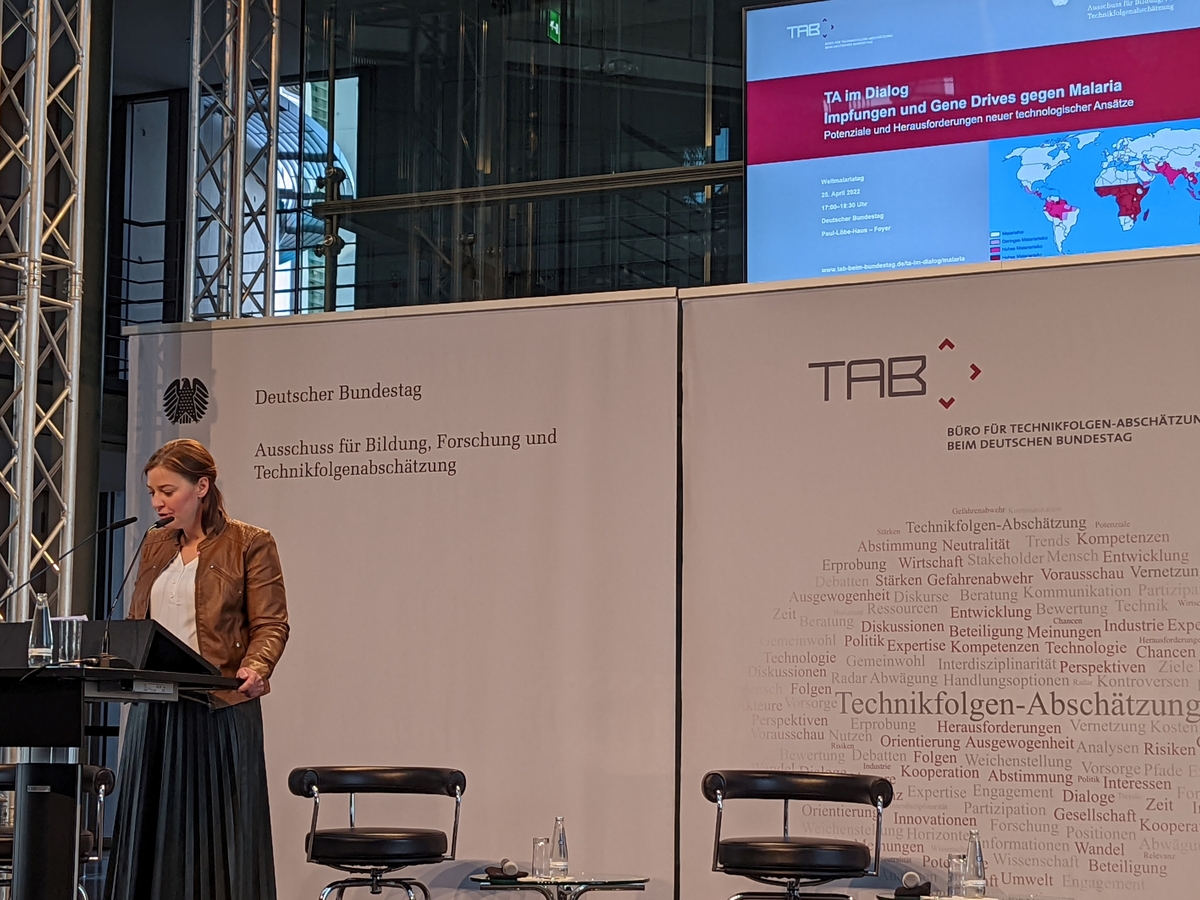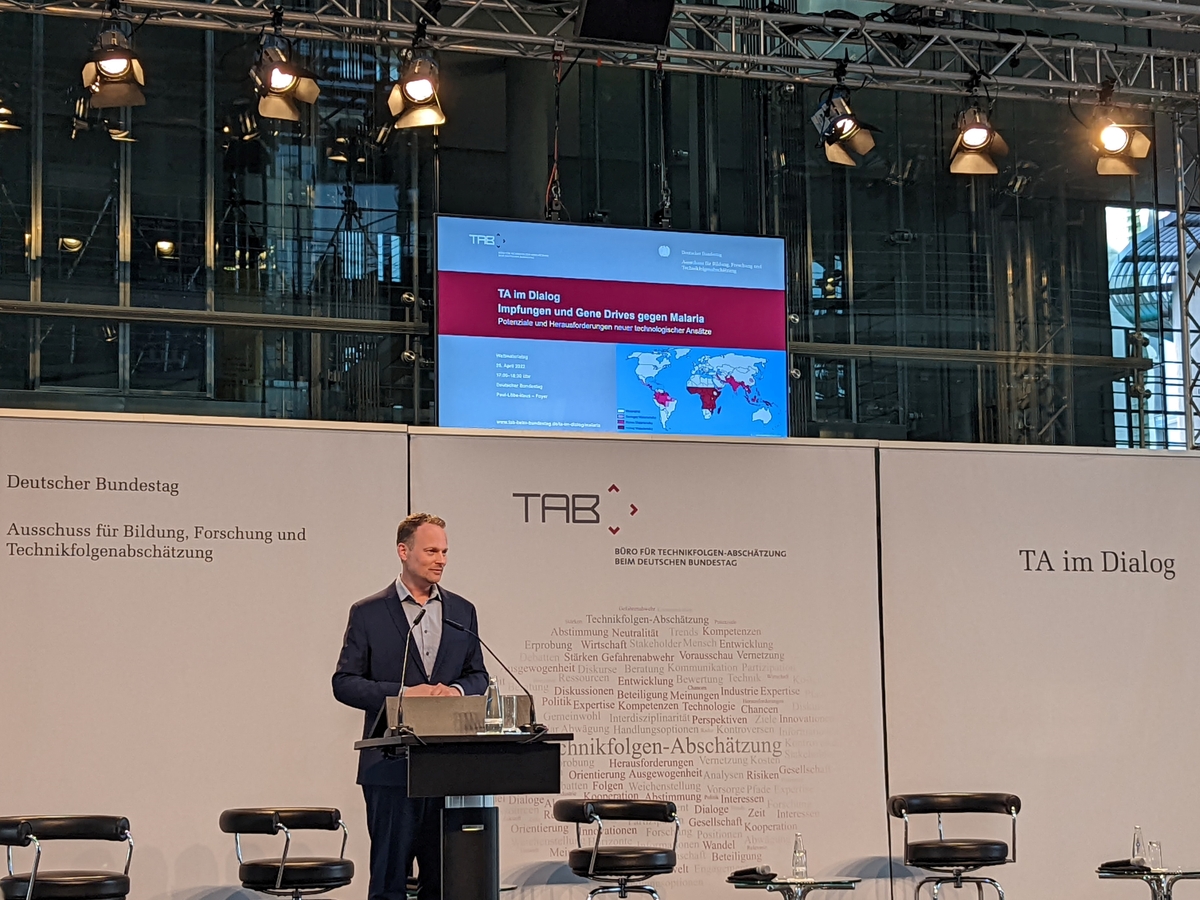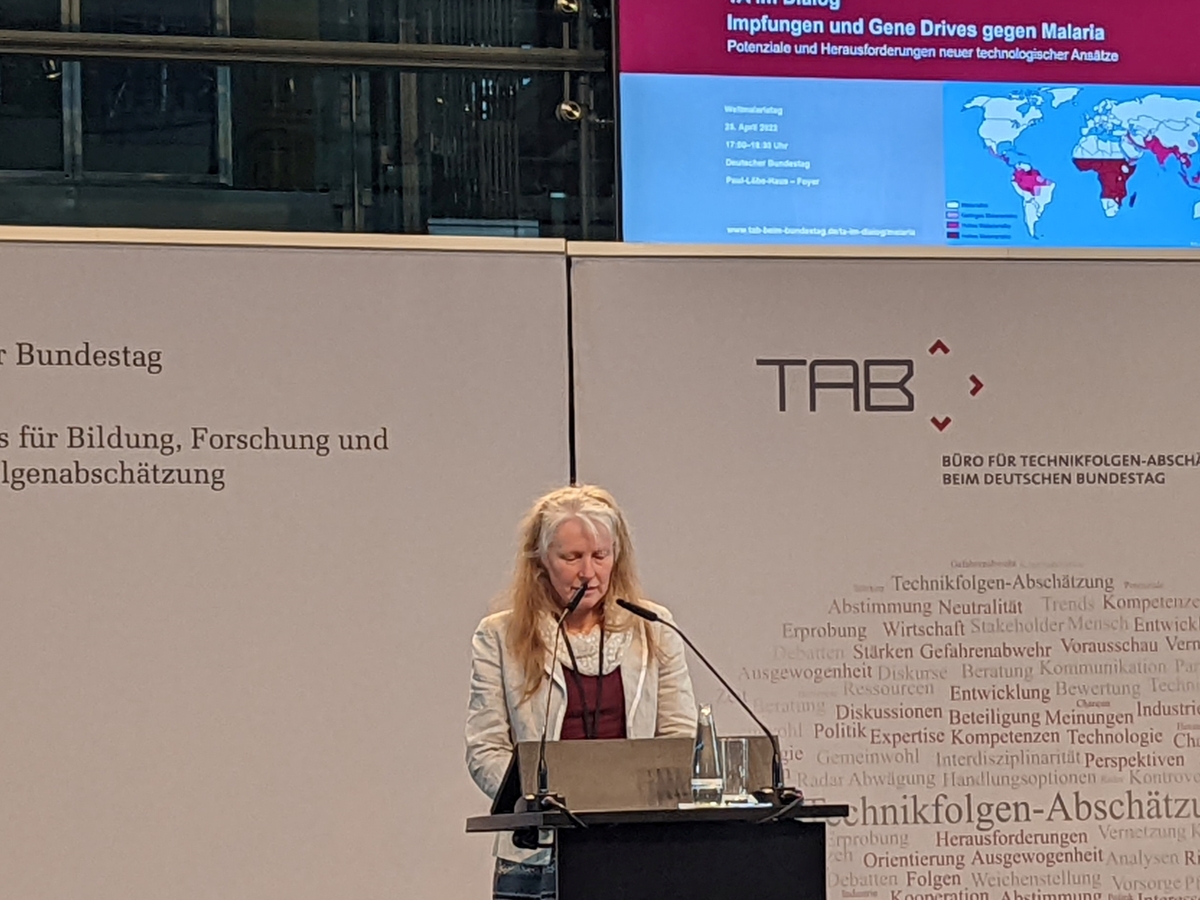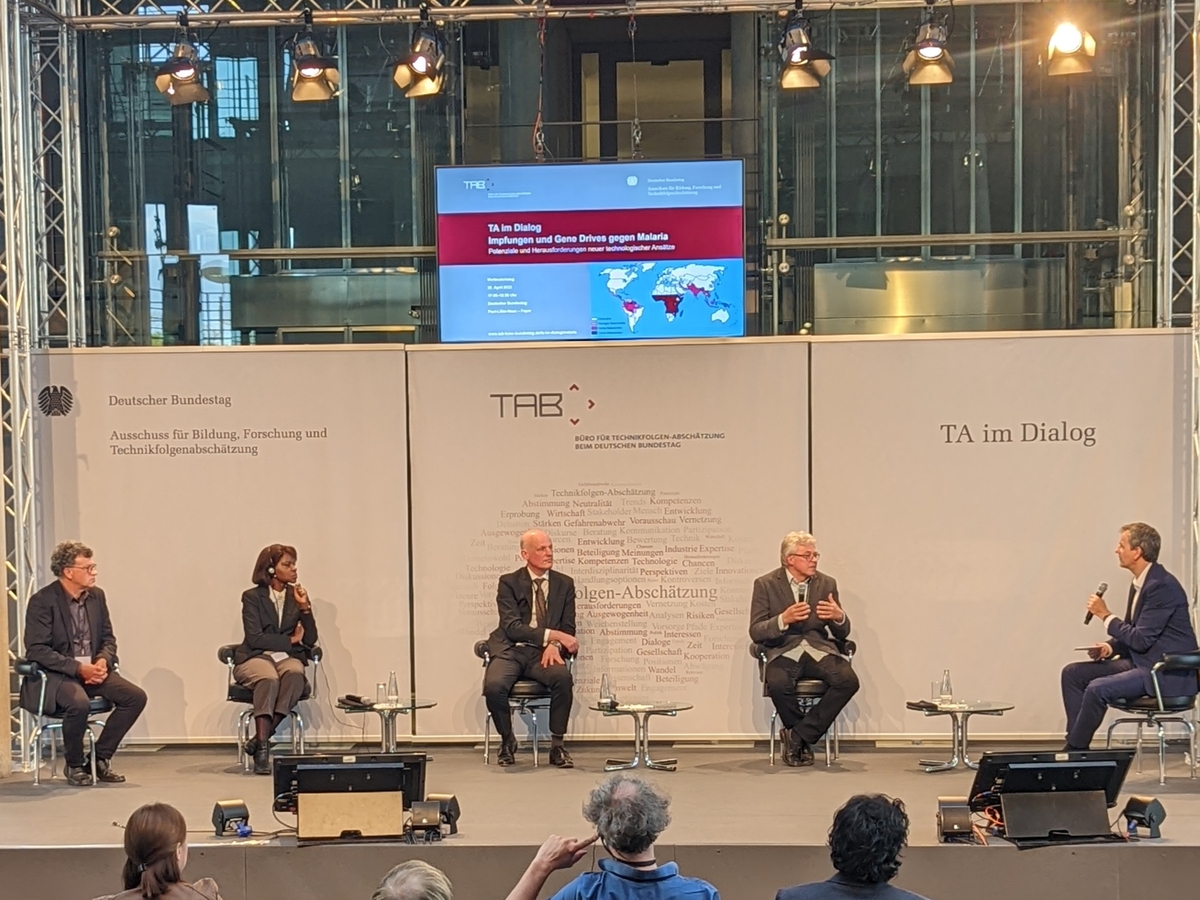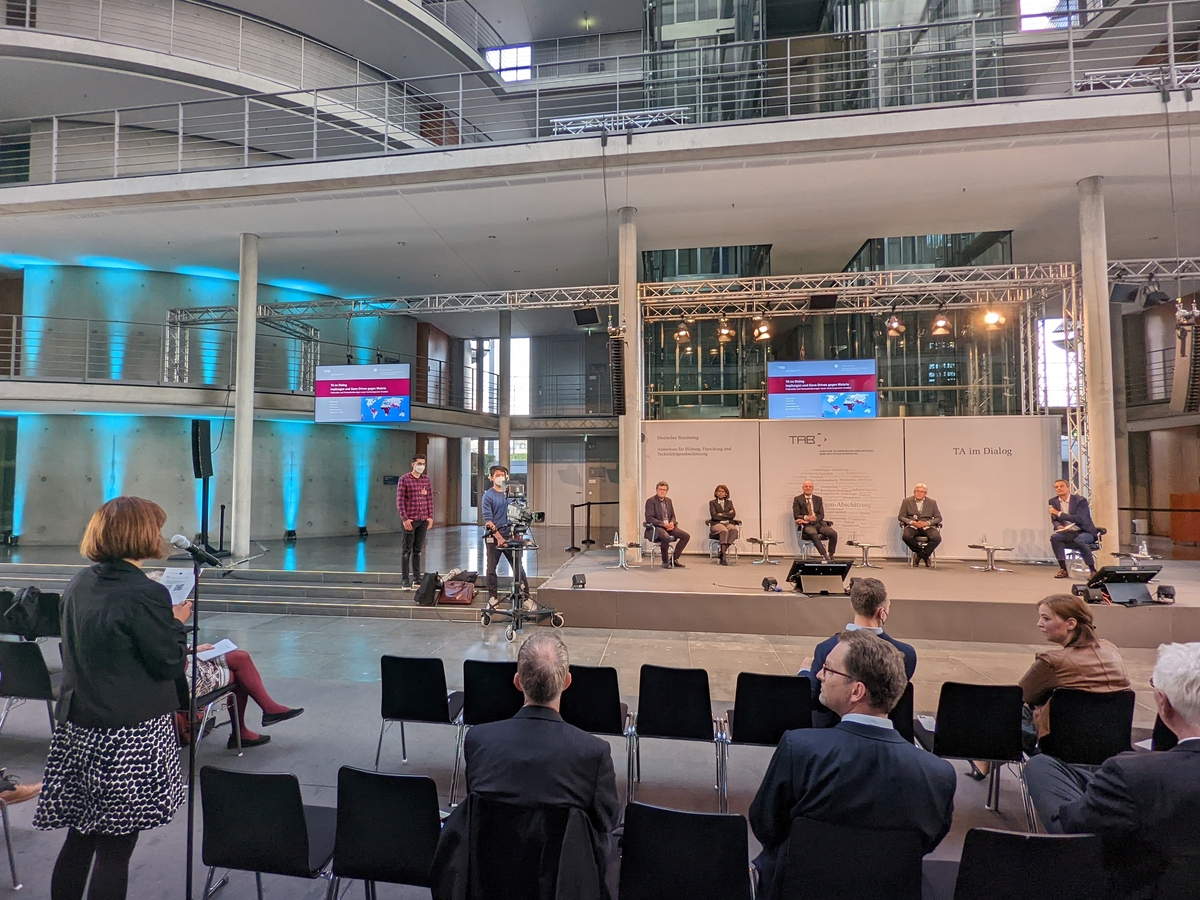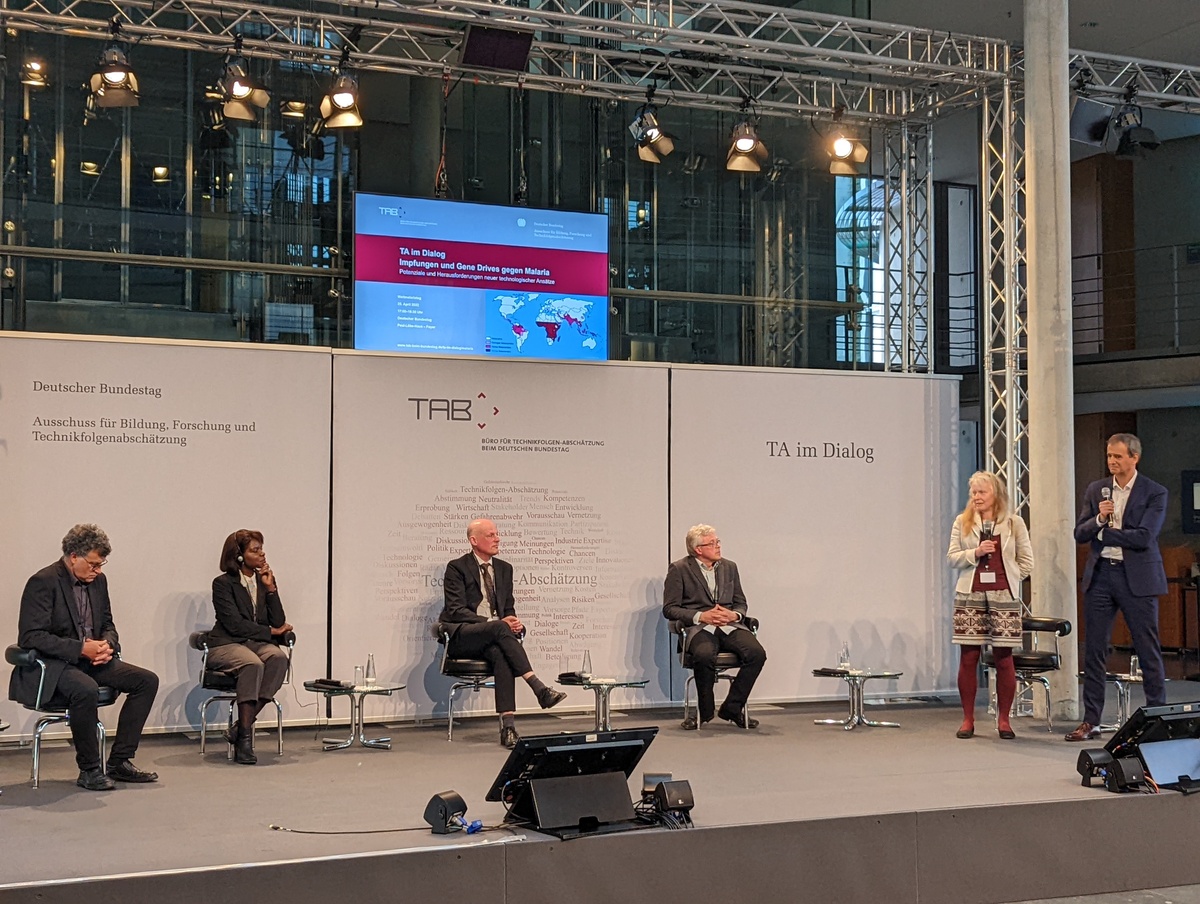"TA in Dialogue" on World Malaria Day
Vice President of the German Bundestag Yvonne Magwas opened the event in the foyer of the Paul Löbe House. She referred to the global dimension of the disease and its fight in view of the approximately 600,000 people, mainly young children, who die of malaria every year. At the same time, she said, there needs to be a renewed focus on the commitment of countries in the global North under the 2030 Agenda to use their scientific resources to develop and deliver disease control measures.
The chairman of the Committee on Education, Research and Technology Assessment (ABFTA), Kai Gehring, emphasized that parliamentary technology assessments, i.e. the consideration of technological developments and the associated opportunities and challenges, as well as their situational benefit considerations, are multi-layered and complex. TAB reports such as the one on drug development for poverty-associated neglected diseases provide a solid knowledge base not only for political decision-makers and are evidence of evidence-based policy advice at the cutting edge of scientific knowledge. The new event format "TA in Dialogue" will provide an additional opportunity to address current research and technological developments in a timely manner and also to discuss different technological approaches in a comparative manner. In addition to the current status of malaria vaccine development, the kick-off event will also include a classification of gene drive technology and its potential for malaria mosquito control.
By way of introduction, TAB project manager Dr. Katrin Gerlinger looked back on 60 years of malaria control. This has always had two thrusts: One is the prevention and treatment of the infectious disease, the other is the control of malaria mosquitoes. There have been and still are different positions on the benefit assessment of each measure in this regard, which have been adjusted again and again over the course of time. Since the currently available means do not succeed in substantially reducing the high disease burden in sub-Saharan Africa, new biotechnological approaches to malaria control are always associated with new hopes.
To discuss the potentials and challenges of current approaches, TAB had invited Prof. Dr. Francine Ntoumi, an outstanding African malaria expert, Prof. Dr. Benjamin Mordmüller, one of the most renowned German malaria vaccine researchers, Dr. Volker Öppling, who is in charge of the relevant study and vaccine approval at the Paul Ehrlich Institute, and Prof. Dr. Ernst Wimmer, a microbiologist researching new approaches to pest control. Unfortunately, Dr. Margret Engelhard, head of the department responsible for gene drive approaches at the German Federal Agency for Nature Conservation, was unable to attend at short notice.
After brief introductions to the topic, Dr. Marc Bovenschulte from TAB consortium partner VDI/VDE-IT moderated a lively technical discussion in which, among other things, the background to the long development periods for malaria vaccines was questioned, the acceptance of a vaccination with limited effectiveness was addressed, and the potentials as well as challenges of gene drive technology were discussed.
At the end of 2021, the WHO recommended for the first time a malaria vaccine for young children that must be administered four times within two years in order to reduce the number of severe infections and deaths by 30%. Volker Öppling emphasized that despite its limited effectiveness, children's lives can be saved. Francine Ntoumi pointed out that it is now more important to embed vaccination in smart information campaigns than to mass administer the vaccine as quickly as possible. Mothers need to be told that vaccination cannot replace other protective measures, such as the use of bed nets or rapid testing and treatment, she said. This also takes time, and quick successes are unlikely, he said. Asked when the next breakthrough in vaccine could be expected, Benjamin Mordmüller said that there are different approaches and currently two of them are being "almost Covid-ized through." He echoed the sentiment that the fight against malaria could only succeed if different measures were combined.
With regard to gene drive technology, the dominant view was that it was currently more vision than reality. It is still unclear whether malaria-causing mosquito populations can be significantly decimated or completely eradicated with such approaches. The greatest concerns relate to the retrievability of modified mosquitoes, as a statement from the auditorium also showed. Since such risks cannot be ruled out, regulations are undoubtedly needed. Ernst Wimmer, however, expressed more concern that gene drive approaches would not work technically than that they could not be controlled.
In response to the question of what political contributions could be helpful, research funding was addressed in particular. One would like to see simplified application procedures. Professor Mordmüller currently invests about 70% of his working time in formulating grant applications and not in developing new vaccines.
After the lively panel discussion on site, the event team agreed that the new event format "TA in Dialog" is an informative addition to ongoing and completed TA projects and, through broadcasting on parliamentary television and the possibility of participation via the Internet, offers new access for members of parliament and employees of the Bundestag as well as for the interested public. Of course, complex biotechnological processes, different approaches to the expansion of international research cooperation or to changes in funding mechanisms cannot be presented and discussed in depth. Therefore, from TAB's point of view, detailed analyses in the form of TA studies remain indispensable for a comprehensive formation of opinion. The event also showed that the TAB report on new medicines against poverty-associated neglected diseases (TAB-Fokus and Summary in English) has lost little of its relevance and topicality, because the social challenges and approaches to solutions in the fight against malaria described there are rich in detail, comprehensive and forward-looking. And also as far as gene drives are concernde: the opportunities and risks of technologies for propagating genetic modifications in populations are dealt with far more comprehensively in the currently running TAB project than was possible in 90 minutes.
As part of the "TA im Dialog" series, TAB together with ABFTA would like to continue to take up current research and technological developments and discuss them in the foyer of the Paul Löbe House in order to strengthen the exchange between science, politics and civil society.
May 2, 2022
